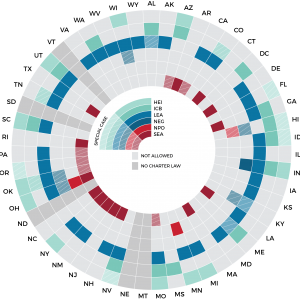The critical role authorizers play in determining the quality of charter schools is often misunderstood, even by those with influence over authorizer practices. Good authorizing leads to great charter schools. When we improve authorizing around the country, we create better educational opportunities for millions of students.
Watch and share the below videos for a succinct explanation of charter school authorizing and why #AuthorizingMatters for school quality.
Authorizing Basics: What is a Charter School?
Charter schools are independently run public schools that are granted greater flexibility to meet children’s needs in return for greater accountability for meeting their promises to families and taxpayers.
Simply put, charter schools receive more freedom for meeting higher expectations.
But charters don’t just pop up in a community. Behind every charter school is an authorizer—and its responsibilities are essential to producing great charter schools around the country.
Authorizing Basics: What is a Charter School Authorizer?

Authorizers vary depending on state law. Nearly 90 percent of authorizers across the country are local school districts, but they can also be state education agencies, independent boards, universities, mayors and municipalities, and non-profit organizations.
Some states have many types of authorizers (California, Ohio, Michigan), while others have only a few (Massachusetts, New York, Arizona). Best practice is to have more than one type of authorizer (local school districts plus an alternative); however, in six states, school districts are the only bodies that can approve and oversee charter schools.
Why Authorizing Matters For Charter School Quality
What is Quality Charter School Authorizing?
Authorizers should ensure each school has freedom and flexibility to innovate and meet student needs, while also making sure the school is succeeding and open to all. If and how authorizers fulfill their responsibilities—approving new schools, monitoring performance, and closing failing schools—determines the overall quality of charter schools in a community.
Smart, proactive authorizing can transform public education, as we’ve seen in places like Boston, Denver, Indianapolis, New Orleans, and Washington D.C.
Good authorizers make it their mission to give more students access to great schools. They expand choices for parents by opening and growing more great schools. They focus on what a charter school achieves, not how it does the work. They set clear expectations on the front end and use strong accountability on the back end. If a school isn’t serving students and taxpayers, a good authorizer closes that school and works to ensure students can smoothly transition into better options.
What is Bad Charter School Authorizing?
When done well, authorizing is a catalyst for charter school quality and growth. Unfortunately, the quality of charter laws and authorizing institutions varies across the country. This is why we see uneven charter quality and availability, as some authorizers block access, innovation, and growth.
When authorizers overregulate schools, they create the same box-checking, red tape, and one-size-fits-all directives that sparked the creation of charter schooling in the first place. When they create too many obstacles to opening a charter school, they do a disservice to kids and families that need options. And when they turn a blind eye to quality—or completely forgo their responsibilities—they fail children by allowing mediocre schools to remain open.

